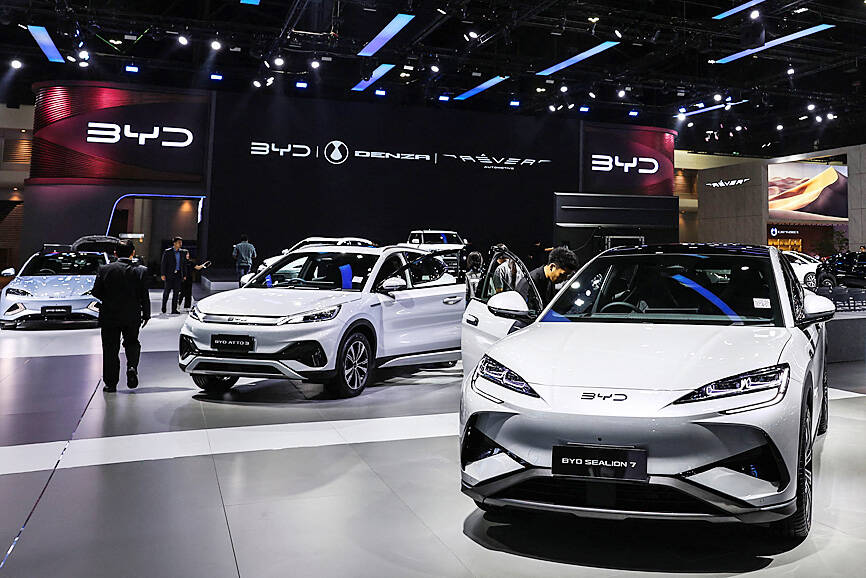BYD Co’s (比亞迪) sales last year surpassed the US$100 billion mark, leapfrogging Elon Musk’s Tesla Inc on revenue, as the Chinese auto giant wows consumers with a range of electric and hybrid cars packed with high-tech features.
Shenzhen-based BYD reported revenue of 777 billion yuan (US$107 billion) for the 12 months ended on Dec. 31, up 29 percent, according to a filing late on Monday, beating estimates for 766 billion yuan. Tesla’s revenue last year was US$97.7 billion. The Chinese company’s net income rose 34 percent year-on-year to 40.3 billion yuan, beating analyst estimates for 39.5 billion yuan.
BYD has risen quickly to the top of China’s car market — the world’s biggest and most competitive in terms of electric vehicles (EVs). This year alone, BYD has unveiled a new ecosystem that allows EVs to charge for 400 kilometers in just five minutes and introduced advanced driver assistance technology in even its most basic models. Investors have sent its shares to a record and BYD’s Hong Kong-listed stock is up around 51 percent this year.

Photo: Chalinee Thirasupa, Reuters
BYD also sells about the same number of EVs as Tesla — 1.76 million units last year versus 1.79 million units — but, when all of its other passenger hybrid car sales are included, it’s much larger. BYD’s total deliveries last year climbed to 4.27 million units, almost as much as Ford Motor Co.
BYD has forecast it can sell between 5 million to 6 million vehicles this year. It’s already off to a strong start, with sales in the first two months of this year up 93 percent year-on-year to 623,300 units.
However, one area where Tesla still clearly leads is market valuation. The US carmaker is worth about US$800 billion despite a share-price rout that has seen the stock plunge 38 percent this year. BYD has a market capitalization closer to US$157 billion.
Musk’s EV maker also makes more money on an absolute basis; Tesla’s net income last year was US$7.6 billion.
But whereas Tesla is losing in China — shipments have been backsliding there for the past five consecutive months on a year-on-year basis — BYD is winning. China is still far and away BYD’s biggest market, where it commands a share of almost 15 percent, not just for new-energy vehicles but any sort of passenger car.
BYD doesn’t sell passenger cars in the US yet due to punitive tariffs on made-in-China automobiles, but it has made big inroads into markets in Europe, places in Asia like Singapore and Thailand, as well as Australia.
BYD chairman and founder Wang Chuanfu (王傳福) said in a statement the company planned to keep boosting research and development while bolstering its product competitiveness, including in its focus of succeeding outside of China.
He also said that Chinese auto brands in the era of intelligence-led vehicles were no longer merely followers, but rather at the forefront of the trend. They’re “daring” to be first in the world and are collaborating with other domestic brands to go global and move up the value chain, he said.

Nvidia Corp chief executive officer Jensen Huang (黃仁勳) on Monday introduced the company’s latest supercomputer platform, featuring six new chips made by Taiwan Semiconductor Manufacturing Co (TSMC, 台積電), saying that it is now “in full production.” “If Vera Rubin is going to be in time for this year, it must be in production by now, and so, today I can tell you that Vera Rubin is in full production,” Huang said during his keynote speech at CES in Las Vegas. The rollout of six concurrent chips for Vera Rubin — the company’s next-generation artificial intelligence (AI) computing platform — marks a strategic

REVENUE PERFORMANCE: Cloud and network products, and electronic components saw strong increases, while smart consumer electronics and computing products fell Hon Hai Precision Industry Co (鴻海精密) yesterday posted 26.51 percent quarterly growth in revenue for last quarter to NT$2.6 trillion (US$82.44 billion), the strongest on record for the period and above expectations, but the company forecast a slight revenue dip this quarter due to seasonal factors. On an annual basis, revenue last quarter grew 22.07 percent, the company said. Analysts on average estimated about NT$2.4 trillion increase. Hon Hai, which assembles servers for Nvidia Corp and iPhones for Apple Inc, is expanding its capacity in the US, adding artificial intelligence (AI) server production in Wisconsin and Texas, where it operates established campuses. This

US President Donald Trump on Friday blocked US photonics firm HieFo Corp’s US$3 million acquisition of assets in New Jersey-based aerospace and defense specialist Emcore Corp, citing national security and China-related concerns. In an order released by the White House, Trump said HieFo was “controlled by a citizen of the People’s Republic of China” and that its 2024 acquisition of Emcore’s businesses led the US president to believe that it might “take action that threatens to impair the national security of the United States.” The order did not name the person or detail Trump’s concerns. “The Transaction is hereby prohibited,”

Garment maker Makalot Industrial Co (聚陽) yesterday reported lower-than-expected fourth-quarter revenue of NT$7.93 billion (US$251.44 million), down 9.48 percent from NT$8.76 billion a year earlier. On a quarterly basis, revenue fell 10.83 percent from NT$8.89 billion, company data showed. The figure was also lower than market expectations of NT$8.05 billion, according to data compiled by Yuanta Securities Investment and Consulting Co (元大投顧), which had projected NT$8.22 billion. Makalot’s revenue this quarter would likely increase by a mid-teens percentage as the industry is entering its high season, Yuanta said. Overall, Makalot’s revenue last year totaled NT$34.43 billion, down 3.08 percent from its record NT$35.52